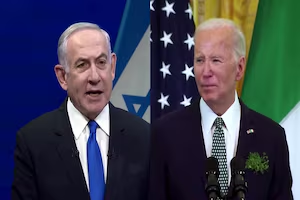In a significant diplomatic exchange, U.S. President Joe Biden recently had his first phone call with Israeli Prime Minister Benjamin Netanyahu in two months. The focus of their conversation? The escalating situation in Gaza, specifically the potential for an Israeli military operation in Rafah.
During the call, President Biden delivered a clear message to Netanyahu: An Israeli incursion into Rafah would deepen anarchy in the already volatile region. The stakes are high, and both leaders recognized the need for urgent dialogue.
Tensions between Israel and the United States have risen, and the situation in Gaza remains precarious. The possibility of a famine looms over northern Gaza, with half of the population facing “crisis levels of food insecurity or worse,” according to the United Nations. Against this backdrop, any military action could have severe consequences.
Biden and Netanyahu agreed that teams from each side would meet in Washington to discuss the situation. White House national security adviser Jake Sullivan emphasized the importance of a comprehensive discussion on the way forward in Gaza. The goal is to find a path that ensures safety, stability, and humanitarian support for the people caught in the crossfire.
As the world watches, the delicate balance between security concerns and humanitarian needs hangs in the balance. The Rafah issue is a red line, and any misstep could exacerbate an already fragile situation.
President Biden’s warning underscores the gravity of the moment. The fate of Gaza rests on delicate negotiations, and the international community holds its breath. As the crisis unfolds, the world waits to see whether diplomacy can prevail over conflict.




Comments
Post a Comment